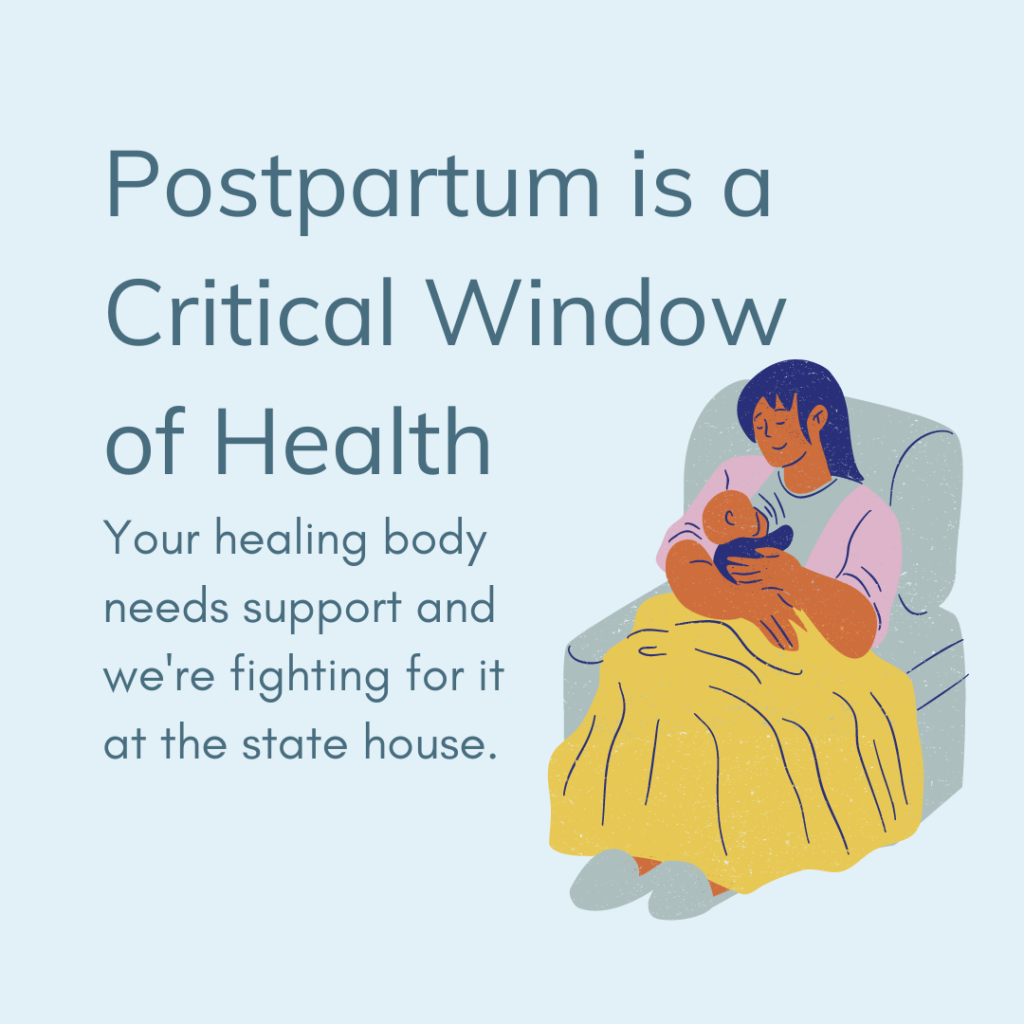Postpartum Support Goes a Long Way in Healthcare

At our practices in Stratham and Dover, we see around 600 patients per month, all of whom have some sort of pelvic floor dysfunction.
We are in-network with several insurances and out of network with others because it’s been such a challenge to work with insurance over the last several years because of under-coverage.
The postpartum period is such a critical window of health. If we can figure out a way to help people during this critical time, it will go such a long way in healthcare.
We see so many people who have developed issues because of the lack of support during the postpartum period. The body has been through trauma–which is normal, even an uneventful delivery is tough on the body–where ligaments have stretched and muscles are damaged. We do heal from it, but without proper support and guidance, we don’t heal well.
Our culture simply doesn’t support postpartum healing and recovery. I would love to see New Hampshire at the forefront of changing this culture and demonstrating just how resilient people can be when they have proper support. Cultural beliefs around recovery are one barrier, but insurance coverage can also be a significant barrier to receiving care and support, and I believe we can change that. If people have access to coverage, not just for an injury or something wrong–and everyone has something wrong, that’s just how babies exit the body–then we can find support for postpartum parents.
If you think PT is already covered, it’s much more complicated than that.
I think back to my own experience. You’re at home two weeks after a fairly healthy, uncomplicated vaginal delivery. I had pretty significant tearing with one delivery, but not on the other. You bleed for a fairly long time at home and you’re just not sure of how to do anything. You’re in a state of survival just trying to help your baby. This is all new to you.
And your body is completely changed. It’s not working the way it did before. Most people have some degree of pain. There’s some leakage. You just don’t know what’s happening and all you do is just take care of the baby and not yourself.
The whole medical culture revolves around the baby’s health, which is fantastic, except that it should also support the birthing parent’s health.
I wish that someone had asked me how I was doing at two weeks, at four weeks. I wish there was somebody who could have helped me navigate how to position my body so it didn’t hurt. I was that somebody was there to just guide me through deciding when I was ready to do certain things.
For most people in this culture, we push through and do things before we’re ready, and the ramifications of that in the postpartum period can be pretty significant.
We see people in our practice all the time with prolapse–which is a condition that can be helped but not cured–and the lifelong complications and potential costs of something like this are significant.
The critical window of postpartum is a window into that person’s health. This is when autoimmune conditions kick in, this is when cardiovascular conditions can kick up, and if you are able to have support in this time, it really transitions throughout your life.
This is a time when you can neurologically reset so many conditions. And when we think about postpartum depression, the risk of not having support during this time is significant. If we can figure out a way to support people, it has to be done.
I think the ideal coverage would be something like three to six postpartum pelvic physical therapy visits, independent of symptoms. Pregnancy and delivery alone are injuries to the body. It just has to be coded that way. And we have to change the culture of making sure you go to your postpartum providers, and make it just part of insurance coverage, just like mental health and preventative healthcare is now in New Hampshire. That’s how the postpartum fourth trimester should be viewed.
It also needs to be covered appropriately. Not under-covered or covered under the cost that it should be. It needs to be covered equally across organizations–outpatient providers paid the same as hospitals, Medicaid paid the same as Anthem. It should be blanket covereage that’s covered well, so that providers can cover the costs of their business.
I would love to take all the insurances, but I would go out of business if I did. I can only take the few that actually do cover our costs of doing business, and I run a pretty efficient business. If I take Medicaid, United, Harvard Pilgrim, or some of the other plans, they don’t reimburse enough to cover the cost of admin, rent, and therapists. It’s under-coverage.
And even when you are in-network, high deductibles put postpartum care out of reach. They go to the hospital and it’s $300 per visit. They go to an outpatient provider and it might be $100-200 per visit, but either way it’s up to their deductible. It’s just another barrier where there should be coverage.
Even just a little more coverage in this time would go so far from a support and educational perspective.
I urge everybody to reconsider how these conditions and how this postpartum time is covered for people who have just delivered a baby. It would be so great if New Hampshire could be on the forefront and we could say, “This is how it’s done. This is how you support people.”
And guess what? It doesn’t cost any more money in the long run.
*This transcript has been lightly edited for grammar and clarity.